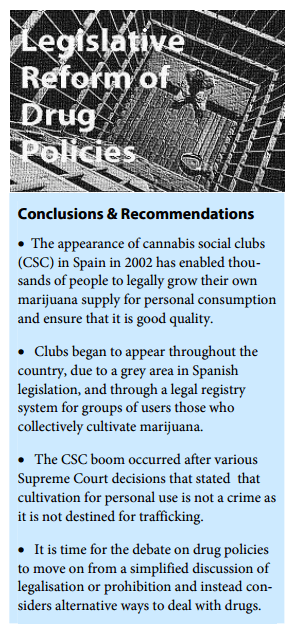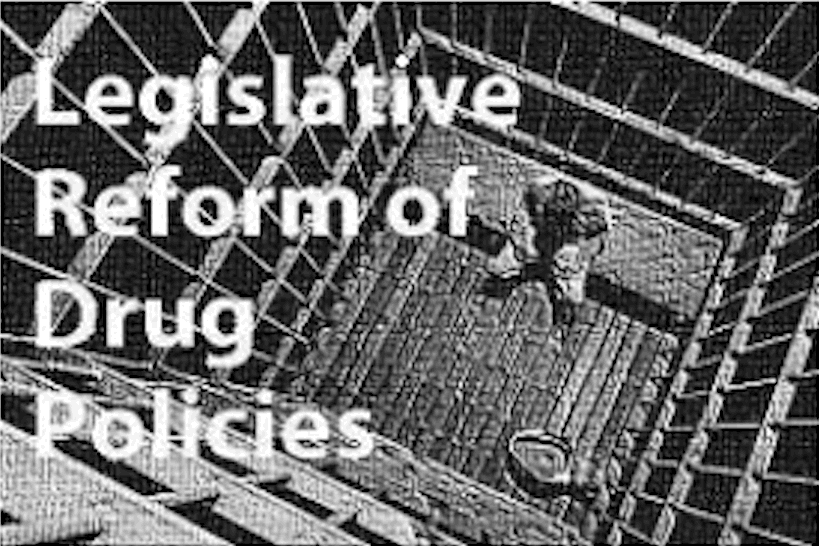Cannabis social clubs (CSC) are noncommercial organisations of users who get together to cultivate and distribute enough cannabis to meet their personal needs without having to turn to the black market. They are based on the fact that the consumption of illegal drugs has never been considered a crime under Spanish legislation. Taking advantage of this grey area, private clubs that produce cannabis for non-profit distribution solely to a closed group of adult members have existed for years.
Since their appearance in 2002, CSCs have enabled several thousand people to stop financing the black market and to know the quality and origin of what they are consuming, whilst creating jobs and tax revenue. All of this has happened without having to withdraw from existing UN drug treaties.

The Birth Of A Movement: Associating cannabis users and the first Collective cultivations
To make a stand against the prohibition of consumption in public places was one of the initial objectives of the cannabis movement, which emerged in 1993 through the Asociación Ramón Santos de Estudios Sobre el Cannabis (ARSEC) group in Barcelona. Another objective was to put an end to the juridical insecurity regarding cultivation, finding a legal way to be self sufficient.
ARSEC sent a letter to the anti-drug public prosecutor asking whether it would be considered a crime to grow cannabis for use by a group of adult users. The reply was Series on Legislative Reform of Drug Policies that in principle this was not criminal behaviour, which resulted in a cultivation experiment destined for around 100 people, that was broadcast by the media. The crop was confiscated, but the provincial court acquitted those involved, although the case was later taken to the Supreme Court. Meanwhile, other groups emerged that followed in the footsteps of ARSEC. The first to do so was the Kalamudia association from Bilbao, which produced a crop of around 600 plants for the use of 200 people, including some members of the regional parliament and a few town councillors from various political parties, as well as artists, trade unionists, doctors, etc. The legal case was closed soon after being opened and the crop harvested without legal obstacles.
However the ARSEC case, which was pending conclusion for two years, was settled a few days later with a minimum prison sentence (which was suspended) and fines against the directors of the association. The Supreme Court stated, that although it was clear that ARSEC did not intend to traffic drugs, the cultivation of cannabis was dangerous per se and therefore should be punished. As a result, in principle they closed the doors to drug cultivation associations.
Nevertheless, in 1999, the Kalamudia association decided to challenge the law and repeat their public and collective marijuana plantation. The public prosecutor did not intervene. The crop was once again harvested without incident and in the presence of television cameras. In 2000 the third crop was produced, and again provoked no legal action. In the face of this lack of
opposition the associations decided to seek some institutional and legal stability for their cultivations.
The Cannabis Club Model Is Born
Meanwhile, the regional government of Andalusia commissioned a juridical report on the possibility of setting up establishments where people would be able to obtain cannabis whilst respecting the legal framework. The authors Juan Muñoz and Susana Soto, after fully analysing the jurisprudence on cannabis and other illegal substances, reached the conclusion that these establishments should be “Centres that are not open to an indiscriminate public, but where access is restricted to hashish or marijuana smokers. As a method of controlling access, people would have to be regular users. These would be places of private consumption amongst regular users, where they would be able to obtain and consume quantities that would not exceed the fixed consumption limit.”
The report was never officially published, although it did appear in a prestigious legal journal.3 And even though it was a simple, non-binding, technical report, several institutions seem to have taken its conclusions into account. Little by little, associations began to formalise their set-up: from being registered as “cannabis research” associations they went on to become “cannabis users” associations and included the creation of private spaces for consumption and social cultivation in their statutes.
The pioneer was the Barcelona Catadores Cannabis Club (CCCB), in 2001. Meanwhile the Supreme Court, in decisions
passed between October 1, 2001, and July 9, 2003, contradicted the initial ARSEC judgement, establishing that possession of cannabis, including large quantities, is not a crime if there is no clear intention of trafficking. In subsequent years, the report by Muñoz and Soto and the above Supreme Court decisions would serve as a basis for various judicial resolutions that considered
the cultivations of various cannabis clubs legal. Amongst these cases, the most talked about was the one that took place in 2005 against the Pannagh association. Four members of the group were detained and the association’s cultivations confiscated. This led to a Series on Legislative Ref orm of Drug Policies parliamentary question to the European Commission from the Italian Euro MP Giusto Catania. In it she asked why it is that in a country in which consumption is decriminalised and people can legally join a club of users, it is also possible to prosecute one of these clubs through the criminal justice system for carrying out preparatory activities to consumption.
The commission replied two months later, through the European commissioner for Justice Franco Frattini, saying that the European Union is not responsible for the regulation of conduct related to possession and consumption. In accordance with a Framework Decision by the European Union,4 “the member States guarantee that cultivation of cannabis plants, when carried out illegally, is a punishable offence.” But this obligation disappears in the case of cultivation for personal consumption because, in the words of commissioner Frattini, “article 2.2 excludes cultivation of cannabis for personal consumption from the Council’s Framework Decision as it is defined by national legislation.” Almost immediately the case was closed and, in an unprecedented decision, it was decided that the marijuana confiscated (over 17 kg.) be returned to the members of Pannagh, an event that was much publicized and was probably the trigger of a genuine boom of new associations trying to launch their own cannabis production.
See here to read the full report Cannabis social clubs in Spain: A normalizing alternative underway by the Transnational Institute.





Comments (2)